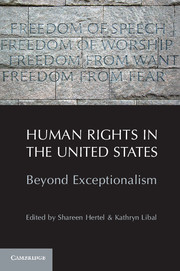Book contents
- Frontmatter
- Contents
- Contributors
- Acknowledgments
- Foreword: Are Americans Human? Reflections on the Future of Progressive Politics in the United States
- 1 Paradoxes and Possibilities: Domestic Human Rights Policy in Context
- SECTION I STRUCTURING DEBATES, INSTITUTIONALIZING RIGHTS
- SECTION II CHALLENGING PUBLIC/PRIVATE DIVIDES
- SECTION III FROM THE MARGINS TO THE CENTER: MAKING HARMS VISIBLE THROUGH HUMAN RIGHTS FRAMING
- 10 The Law and Politics of U.S. Participation in the UN Convention on the Rights of Persons with Disabilities
- 11 The Anomaly of Citizenship for Indigenous Rights
- 12 Human Rights Violations as Obstacles to Escaping Poverty: The Case of Lone-Mother-Headed Families
- 13 The Human Rights of Children in Conflict with the Law: Lessons for the U.S. Human Rights Movement
- 14 LGBT Rights as Human Rights in the United States: Opportunities Lost
- 15 No Shelter: Disaster Politics in Louisiana and the Struggle for Human Rights
- APPENDIX 1 Universal Declaration of Human Rights
- APPENDIX 2 International Covenant on Economic, Social and Cultural Rights
- APPENDIX 3 International Covenant on Civil and Political Rights
- Index
- References
15 - No Shelter: Disaster Politics in Louisiana and the Struggle for Human Rights
Published online by Cambridge University Press: 05 June 2012
- Frontmatter
- Contents
- Contributors
- Acknowledgments
- Foreword: Are Americans Human? Reflections on the Future of Progressive Politics in the United States
- 1 Paradoxes and Possibilities: Domestic Human Rights Policy in Context
- SECTION I STRUCTURING DEBATES, INSTITUTIONALIZING RIGHTS
- SECTION II CHALLENGING PUBLIC/PRIVATE DIVIDES
- SECTION III FROM THE MARGINS TO THE CENTER: MAKING HARMS VISIBLE THROUGH HUMAN RIGHTS FRAMING
- 10 The Law and Politics of U.S. Participation in the UN Convention on the Rights of Persons with Disabilities
- 11 The Anomaly of Citizenship for Indigenous Rights
- 12 Human Rights Violations as Obstacles to Escaping Poverty: The Case of Lone-Mother-Headed Families
- 13 The Human Rights of Children in Conflict with the Law: Lessons for the U.S. Human Rights Movement
- 14 LGBT Rights as Human Rights in the United States: Opportunities Lost
- 15 No Shelter: Disaster Politics in Louisiana and the Struggle for Human Rights
- APPENDIX 1 Universal Declaration of Human Rights
- APPENDIX 2 International Covenant on Economic, Social and Cultural Rights
- APPENDIX 3 International Covenant on Civil and Political Rights
- Index
- References
Summary
Following U.S. government failures before, during, and after Hurricane Katrina, social justice organizers and advocates increasingly turned to human rights frameworks to challenge the state. The 2005 hurricane revealed the human cost of domestic disaster policy, with regard to both disaster evacuation and shelter. Almost exactly three years later, Hurricane Gustav hit the Gulf Coast, triggering the largest evacuation in Louisiana history. As the first significant post-Katrina disaster event in the greater New Orleans area, Gustav provides an important opportunity to examine the ways in which community organizers have contested domestic disaster policy. Using sheltering policy as an example, we explore social movement efforts to resist and transform U.S. disaster politics. In particular, we examine the emergence of a human rights discourse for reframing disaster-related social problems. In light of the expansion of domestic human rights activity sparked by the Gulf Coast hurricanes (Luft 2009; Soohoo, Albisa, and Davis 2008), we believe this local case study has broader significance for both the practice and the scholarship of U.S. human rights.
For at least ten years before Hurricane Katrina, there was a growing resurgence of domestic human rights movement activity (Soohoo et al. 2008). Katrina laid bare not only the limitations of U.S. disaster policy but also the social contract to provide well-being more generally. These contradictions further inspired national and local movement actors to turn to human rights frameworks to contest the state's handling of both the disaster and the recovery.
- Type
- Chapter
- Information
- Human Rights in the United StatesBeyond Exceptionalism, pp. 291 - 312Publisher: Cambridge University PressPrint publication year: 2011
References
- 1
- Cited by

